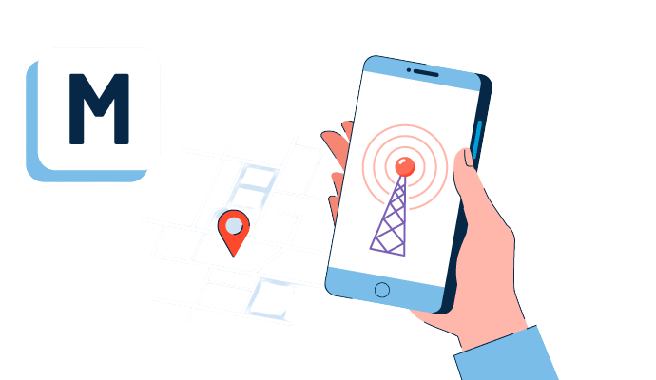
But what happens to all that information? And how can we protect ourselves from potential security breaches in the future?
In this post, we’ll explore whether or not your phone is actually listening to you and share some tips on how to stay secure in 2023 and beyond.
So buckle up and get ready for some eye-opening insights!
What is phone tracking?
Phone tracking is the process of using a phone’s GPS signal to track its location, while you may call it phone listening it’s merely a way of tracking your activity and location. This can be done for a variety of reasons, such as to find a lost or stolen phone, to keep tabs on someone’s whereabouts, or to monitor employees during work hours.
There are a few different ways to track a phone’s location. One is to use a tracking app that must be installed on the phone beforehand. Another is to use the “Find My Device” feature built into many smartphones, which uses GPS and other signals to locate a lost or stolen phone.
Lastly, some cell phone carriers offer location-tracking services that can be used to find a missing phone. These services typically require the cooperation of law enforcement, however, so they are not always an option.
No matter which method you use, tracking a phone’s location can be an invasion of privacy. If you have any concerns about someone tracking your phone without your permission, there are steps you can take to prevent it from happening.
How does phone tracking work?
In addition to GPS tracking, some apps and websites may also use other information from your phone such as your IP address, cell tower ID, or Wi-Fi connection information to estimate your location. This process is known as triangulation and can be used to track you even if you’re not using GPS.
Once an app or website has your location data, it can start building a profile of where you go and when. This information can be used for marketing purposes, sold to advertisers, or even used by law enforcement agencies.
Who is tracking my phone?
There are a few different ways that someone could be tracking your phone. If you have an Android device, there is a built-in feature called “Google Location Services” which uses GPS to track your location and share it with Google.
This information is then used to power features like Google Maps and the weather forecast in the Google app. You can turn this off by going into your device’s settings and disabling location services for specific apps, or entirely.
Another way that someone could track your phone or do phone listening is if you have given them access to your location data. This could be done intentionally, such as when you allow a friend to see your location on a map so they can find you, or unintentionally, such as when an app accesses your location data without you realizing it.
When an app accesses your location data, it will usually show up in the permissions section of that app. You can review these permissions and revoke access if you want to.
Finally, someone could also track your phone using its IP address. Every device that connects to the internet has an IP address, which is basically like a home address for that device. This address can be used to figure out approximately where the device is located.
IP addresses are generally not very accurate, but they can give someone a general idea of where you are. If you’re concerned about someone tracking your phone using its IP address, you can use a VPN (virtual private network) to mask your IP address and make it more difficult
How to stop phone tracking
First, consider what apps you have installed on your phone and whether they might be tracking your data. Many popular apps, such as Google Maps and Facebook, collect data about users for marketing purposes.
If you’re concerned about being tracked, you can disable location services for these apps, or uninstall them altogether.
You can also take steps to limit the amount of data your phone collects about you.
For example, you can adjust your privacy settings so that your phone doesn’t share information like your location or contact list with third-party apps. And if you’re really worried about being tracked, you can use a secure messaging app that encrypts your messages end-to-end, so that only the sender and recipient can read them.
Use VPN to stop phone listening
If you’re concerned about your phone listening to you, one of the best things you can do is use a VPN. A VPN will encrypt your traffic and prevent your phone from being able to listen in on your conversations.
There are a number of great VPNs available, so be sure to choose one that’s right for you. Once you have a VPN set up, make sure to connect to it whenever you’re using your phone.
This will help keep your conversations private and secure.
Best VPN to prevent Phone Listening
HideIPVPN offers a VPN service with military-grade encryption, and high-speed servers with unlimited bandwidth.
Our service comes with shared IP addresses so that your activity can never be tied to one particular user, further protecting your privacy.
We also offer DNS leak protection, a Kill Switch, the latest VPN protocols, and a guaranteed no-log policy.
Best VPN Deal! Get HideIPVPN for $2.7/mo!
Every purchase you make comes with a 30-day money-back guarantee.
Conclusion
In 2023, staying secure in a world of connected devices can be daunting. By taking proactive measures such as using a VPN and avoiding untrustworthy apps, you can remain safe and secure from potential threats.
Additionally, it is important to remember that while your phone may not be listening to you directly, the data it collects could still pose serious privacy risks.
Taking these steps now will help ensure that your information remains private in the future.